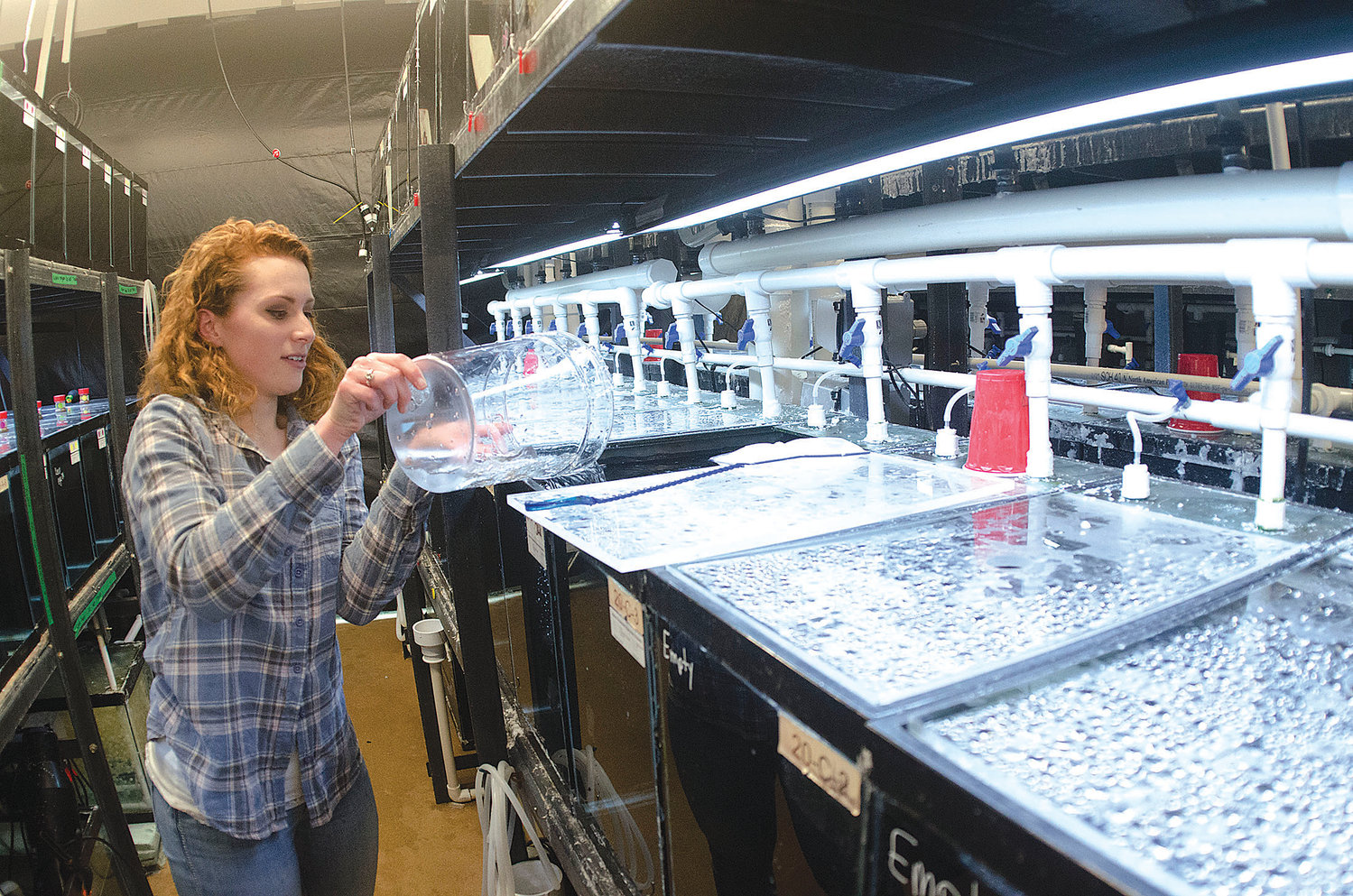At the RWU aquaculture lab, sustainability is the word
Working on solving problems from creating a sustainable feed for farmed fish to saving the world's reefs, aquaculture at RWU has a global reach
When most of us think of Roger Williams University aquaculture, we think oysters.The university’s oyster aquaculture pro-gram, the only shellfish hatchery in the state, has received a lot of …
This item is available in full to subscribers.
Please log in to continue |
Register to post eventsIf you'd like to post an event to our calendar, you can create a free account by clicking here. Note that free accounts do not have access to our subscriber-only content. |
Day pass subscribers
Are you a day pass subscriber who needs to log in? Click here to continue.
At the RWU aquaculture lab, sustainability is the word
Working on solving problems from creating a sustainable feed for farmed fish to saving the world's reefs, aquaculture at RWU has a global reach
When most of us think of Roger Williams University aquaculture, we think oysters. The university’s oyster aquaculture program, the only shellfish hatchery in the state, has received a lot of well-deserved attention. But there’s a lot more to what’s going in in the hundreds of aquaria in the basement of the Marine and Natural Sciences building.
Casey Murray, who holds a master’s degree in Tropical Marine Ecology, is one of three lab managers who oversee the lab with the help of about 35 undergraduate students, and under the direction of Andrew Rhyne, Ph.D., associate professor of Marine Biology and the lab’s principal investigator.
The primary purpose of the lab is to raise fish and invertebrates for the purpose of educating students about aquaculture, but through their partnerships and research projects, their reach extends far beyond their established relationships with the local Audubon and Boston’s New England Aquarium, with which they have a formal partnership.
You might be surprised to learn that they are raising scup, a plentiful local fish, which they have supplied to both the aquarium at Audubon as well as others — they recently shipped some to aquariums in Louisiana and New Hampshire, as the mid-sized schooling fish are popular with public aquariums looking to fill their exhibits. Scup, which are relatively easy to raise, also make good teaching tools for students, along with the clownfish that are the foundation of the student program.
“Even though scup are not threatened, we learn things and are able to apply that knowledge to fish that are in trouble,” said Ms. Murray. “We get to spread our knowledge, and our fish.”
Food supply for farmed fish
Another project the lab is working on could have big implications for farmed fish. Using juvenile rainbow trout, they are
testing a bacteria-based meal to see if it can hold its own against the fish-based meal (a relatively unsustainable product) that has long been the basis for the diet of farmed fish.
It’s not always as easy to cultivate fish as it is with scup and clownfish. “Each fish requires different parameters; they reproduce differently,” said Ms. Murray. “Some lay eggs directly into water, while others lay on a structure.” She points to a Foxface Rabbitfish, an attractive aquarium fish that is very sought after by collectors because it eats algae and helps keep tanks clean.
Safer source of aquarium fish
Like seafood, obtaining sustainably caught aquarium fish can be challenging because of a lack of supply chain transparency. Native to Southeast Asia, nobody has ever successfully raised them in a lab. Unlocking the keys to raising desirable aquarium fish in a lab is one of the principal issues that will need to be overcome to improve the sustainability of the marine aquarium trade.
Most popular coral reef fish come from places like Indonesia and the Philippines; places where local fishers earn a living from selling tropical fish to the trade — sometimes by using the poison sodium cyanide to stun and collect the fish. The practice, which is destructive to both the fish as well as the other occupants of the reef and the reef itself, is depleting fish stocks in the wild. The transit to the markets in the U.S. and Europe also contributes to fish mortality.
While cyanide fishing is illegal, it's also very difficult to detect and regulate. There has never been a successful testing program that can certify fish as cyanide free, and the vast majority of fish are never tested. A 2008 NOAA report highlighted the challenges with the trade in aquarium fish and use of cyanide.
The RWU lab is at the forefront of changing all that. Andrew Rhyne and his colleague Nancy Breen are working to develop a test that is, to oversimplify a bit, drug test similar to how athletes are tested, but for fish. It's not in routine use yet, for that most usual of reasons. It needs to be cost-effective and able to be produced and distributed, affordably, on a scale that will allow it to be used at multiple points along the aquarium supply chain.
Ms. Murray said not all ornamental fisheries are bad. “We are just trying to move the industry towards more sustainable practices, with a mixture of aquaculture and sustainable wild harvest.” Advocates of sustainability are working to train cyanide fishermen to use nets, thus helping locals who depend on these fisheries, to understand that their cyanide fishing methods are basically killing the goose that laid the golden egg.
“We need to educate them so they can make the choice to use best practices,” said Ms. Murray. “Right now, the large parts of aquarium trade, both private and public, are just not sustainable.”






